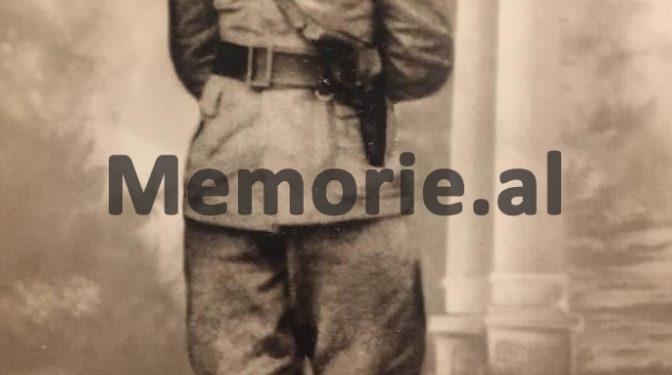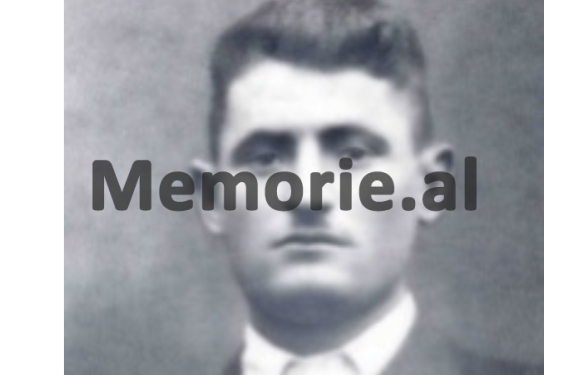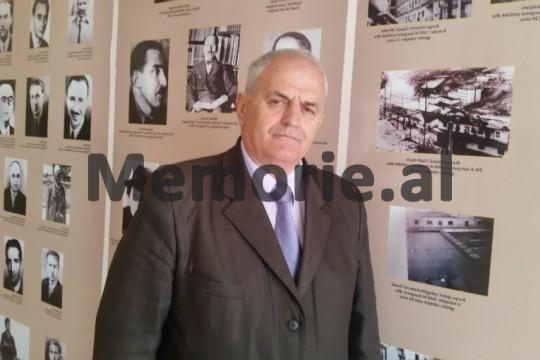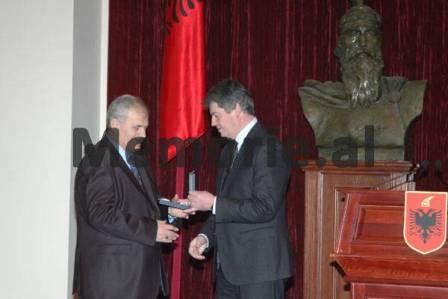Dashnor Kaloçi
Memorie.al publishes the unknown story of the family of Imer Ibrahim Ndregjoni and Llan Destan Ndregjoni from Lukani i Dibra, who sheltered and rescued the Israeli families of Emanuel Ruben with his wife Lea and four daughters: Rashela, Rifka, Bertya and Matilda and their brother-in-law Isaac. In late 1943 and early 1944, Isuf Zenun’s family picked them up and sent them to Jamal Harri’s house; the well-known Zogist major, and from the house of the latter, Imer Ndregjoni, took them over from Abdullah Mëniku and sheltered them in the house of Llan Destan Ndregjoni. The Jews lacked nothing in the Ndregjons. Life was hard for everyone and they had many shortcomings. But they never lacked the love of these honest and proud mountaineers. At the end of the war, Ramadan Biba escorted them to Tirana. The whole history of the noble Dibra family comes in a book by the researcher and writer Xhafer Martini, who for several decades in his creativity has very successfully delivered the historical theme.
“Ndregjonët”, by Xhaferr Martin, a book of values, not only historical
The book “Ndregjonët”, by the well-known writer and researcher, Xhaferr Martini, has outstanding values not only historical, but also cultural in the full sense of the word. At the center of this monograph are not the events, but the people, as the writer gives truthfully and beautifully circumstances, situations, combat actions, etc., but in focus, keeps the people, the historical protagonists, trying to reflect their spiritual world, gives the way lifestyle, psychology, superstitions, rites, on a level of civilization, full of moisture and life, which makes this work distinct from other monographs. The Ndregjons were imbued with the ideas of our national Renaissance, with the love for Ethnic Albania, warriors against all invaders, supporters of the Monarchy and loyal to King Zog I, men with monarchist ideals. Precisely because it had to do with such a tribe, the author does not seem to have entered directly into the “topic”, but in the first two chapters of the book has given briefly and clearly with stylistic feeling and elegance, what is ethnic Albania, what is Albanian nationalism, has reflected the historical fate of Dibra, etc. No tribe and no event in Debar can find full and true reflection if it does not convey in some way the historical fate of Debar, which was divided by the injustices of the time, that exactly this division had its impact in the life of all Dibrans, at all times. Organizing and structuring it in the most appropriate form brings value, add here the mastery of writing without which we cannot talk about a beautiful thing. The first achievement of this author appears precisely in these two indicators. The writer knew how to use his experience as a narrator and novelist in the chapters of this monograph. This is seen in many directions, but especially in those masterful transitions from the near to the distant, from the known to the unknown, from the simple to the complex. The protagonists of this monograph live and work mainly in Lukan, the most strategic village in Katër Grykë. Thanks to the ability of Xhaferr Martin to observe the phenomena and events in the European, Balkan, nationwide aspect, to then reach Dibër, Katër Grykë and Lukan. This is not done as something in itself, but for the purpose of preserving historical logic, proving the great truth that no corner of the world, however lost it may seem, is detached from the “big world”. Thus, as an example, the author gives the contradictions of the time, the result of which was the Russo-Turkish war, which ended with the signing of the Treaty of St. Stephen, which divided Albania. The establishment of the Albanian League of Prizren was dictated by the necessity for the Albanians to organize at the national level in order to preserve the territorial integrity of the homeland. This task was taken over by the League and its branches in the districts. The author with this way of proceeding comes to This Gorge and evidences the contribution of the Ndregjoni tribe in the framework of the League of Prizren. By acting in this way, the contribution of the protagonists becomes comprehensible and with historical logic. Other times the author follows the “opposite path”, which means that he sees an event, a phenomenon from Lukan’s “point of view”, to then come out in the “big world”. This way of alternation gives beauty to the work, but requires mastery to be realized. A great merit of the author lies in the fact that he has a sense of proportion for everything. It does not drown in the multitude of facts, events, but reflects the most culminating ones that have been decisive in our National Movement. Not only events but also documents are selected, preferring those that provide opportunities for new interpretations. The book has enough references to fill the scientific side, but it also has enough lyricism and artistic beauty, not to be dry and soulless creator. The book “Ndregjonët” is not just a historical work. It has major contributions from all fields: literature, linguistics, mythology, demonology, theology, philosophy, folklore, politics, economics, etc. This is not achieved without a broad culture, especially without a deep mastery of popular culture. The well-known writer, researcher and publicist, Dr. Agron Tufa, in the preface to the “Kanun of Dibra” has called this writer (Xhaferr Martin), “a wonderful culturologist”. But feeds from other fields, however beautiful and interesting in themselves, would damage the book, as if they had not become an organic part of it. Xhaferr Martini has the ability to say everything at the right time, put it in the right place and give it in the most beautiful way. When the author, as an example, introduces the educational system of Mulla Liman Ndregjoni, the free system, at the center of which was the respect of the personality of every child, making a flight from the ordinary ones, is thrown and shows briefly, perfectly, the the opposite of Mollah Liman’s education, that is, it tells of the educational and cultural repression that was exercised in the German school at the time when the coming of fascism to power was being prepared. And this the author does not do in vain, but for historical parallelism with any kind of dictatorship. Humanism is given importance in this book. The manifestation of this humanism for our people was also the attitude it held towards the Jews during the Second World War, keeping and protecting them from German Nazism. This was the general, but the specific, the concrete, the author goes and finds them in Lukan, where the Ndregjoni tribe kept the Jews as the people of the house and protected them from the extermination that the Germans wanted to do to them. The author shoots these episodes and attitudes, as he is convinced that heroism does not appear only in war, alone, on the battlefields, that heroes are not only those of the rifle, but also people who have never carried a weapon, even the most pacifist. The book “Ndregjonët” is distinctive, signature, but not full of undeserved praise. The writer seems to understand what Benjamin Franklin said: “Praising the undeserved is a sharp satire.”
The deacons and Jews of the family of Emanuel Ruben
During the Second World War in Albania, it is thought that about 3000 Jews entered, who were persecuted to disappear from German Nazism. The Albanian people welcomed them generously and shared with them the morsel of bread and human love. But that was not all; the Albanian people protected the Jews. The phenomenon of taking the Jews under protection by the Albanian people has many aspects and this is not the place to address them all. The fact is that anti-Semitism has been completely foreign to the Albanian people. Of course, being a government under German Nazi occupation, it could do nothing without agreement with the Germans. “… between the Ministry of Foreign Affairs of the Nazi Reich-hut and the Gestapo, there was a discussion about the position that military and civilian occupying authorities should maintain towards the Jews in Albania, Croatia, in the French part where this army has also taken the place of the fascist one. and in other countries. The parties agreed to apply in all the above territories. On an approximate scale, intensity, Hitler’s doctrine “final solution” – the final disappearance – except Albania, where, as the interlocutors end, this doctrine cannot be applied. The Albanian government had given German troops the status of “transitional army”, they were not considered invading troops. This status was given to them on condition that they did not interfere in the internal governance of Albania. The Jewish-American scholar H. Sarnes, in his book “Jews in Albania – one hundred percent saved”, states, among other things: the latter throughout the country. “As a reward for this, the Nazis would not interfere in the internal affairs of the government.” He took on a special significance for the fate of the Jews, when the Nazi command asked the regency to hand over their lists throughout Albania. Nevertheless, this agreement was not final; it belongs to the first phase of the stay of German troops in our country. The Germans did not rule out the possibility that in the future, with the change of the situation in Albania, their attitude towards the Jews would change, which would mean persecution and extermination as in any other country where there were German invading troops. Less than six months passed and the status of German troops “as a transitional army” in Albania ended. The National Liberation Army of Enver Hoxha’s Albanian partisans did not harass the Jews, but even took them into defense (this is especially true of the commander of the First Assault Brigade, Mehmet Shehu, who also helped them with food), but by attacking the Germans, she caused the latter to undertake the Winter Operation and change their attitude towards the Jews who were in Albania. “And in fact, the Nazis officially demanded not only the lists, but also the gathering of all Jews in one area of concentration.” Despite this, the lists of the Jews were not given to the Germans, nor was their collection done. And this was done by Xhaferr Deva, who “managed to persuade them to withdraw from the request for the submission of the lists of Jews”, thus making it possible for “… national sedra …” to come out stronger than “his well-known anti-Semitism.” This attitude was not only of one person, but of the entire Albanian political class that was part of the government of Mehdi Frashëri. Of course, the agreement between the Albanian government and the German institutions was made at the request and insistence of the Albanian government and was not at all a wish of the Germans. It has been reached with a great compromise on the part of the Germans. The Nazis, as is well known, shot the Jews wherever they could. They had no reason to act differently in Albania, if such a thing would not have been firmly demanded by the Albanian government. Attitude towards Jews does honor to our nation. But it must be said that the Albanian government had the lists of Jews. The Jews themselves were among the people, in the hearths of the Albanian family. The people were unaware of the agreement reached between the two governments. The deal was secret. Few people even knew him from the government. The government even had only the lists of those Jews who had taken Albanian nationality, but there were hundreds of others who came to Albania from the terrible persecutions that were done to them in different parts of the Balkans and Europe. The phenomenon of acceptance and protection that the Albanian people did to the Jews is related to the spiritual constitution of the Albanians. Reflected on caring for and honoring the friend in the broadest sense of the word. The friend for the Albanian of that time was not only the one at the door, with whom he had made friends and mixed blood, but also the distant, the unknown, the other, different in customs, tradition, culture, language, race, in nationality etc. For the Albanian, anyone who knocked on the door was called a friend. The identification of Albanian families who sheltered and protected Jews during World War II is of great value. One of those families is she Ndregjoni në Katër Grykë of Dibra. Hearing as a large nationalist, generous tribe, with the doors once open to the friend and pilgrim, during World War II shelter and protection were given to six Jews. They took refuge in the family of Llan Destan Ndregjoni and Imer Ibrahim Ndregjoni, but all the doors of the other Ndregjoni were open to the Jews. And indeed, they went and entered every hearth Ndregjone. The article: “Ndregjons and Jews”, among others, states: “Imer Ibrahim Ndregjoni and Llan Destan Ndregjoni from Lukani i Dibra, have sheltered and rescued the Israeli families of Emanuel Ruben with his wife Lea and four daughters: Rashela, Rifka, Bertya and Matilda as well as their brother-in-law Isaac. In late 1943 and early 1944, Isuf Zenun’s family picked them up and sent them to Jamal Harri’s house; the well-known Zogist major, and from the house of the latter, Imer Ndregjoni, took them over from Abdullah Mëniku and sheltered them in the house of Llan Destan Ndregjoni. At the end of the war, Ramadan Biba escorted them to Tirana …”!
Llan Destan Ndregjoni was a simple, uneducated man who knew nothing about the Holocaust and the racist savagery of the time. Yes, he knew it most importantly; the Jews were people, creatures of God, in need, predisposed to physical extinction. Llan Destani did not know much about human theories, but he knew that God gives every man life and only he has the right to take it. He knew that the history of mankind is the history of the war between good and evil. Evil has many times emerged victorious, but in the end, it has been defeated by good. Llan Destan Ndregjoni does not respond to hatred with hatred, he had only light in his soul. Life was hard for everyone and they had many shortcomings. But they never lacked one thing, the love of these honest and proud mountaineers. In July 1944, it was agreed that a German battalion would pass through Lukan to reach Mat. The deacons arranged for nothing bad to happen to the Jewish friends. To make sure, they climbed into the mountains, sheltered them in a hut, brought food, clothing, and sleeping clothes, and guarded them day and night with rifles in hand. Only when the danger passed did they go down to the village “. / Memorie.al














